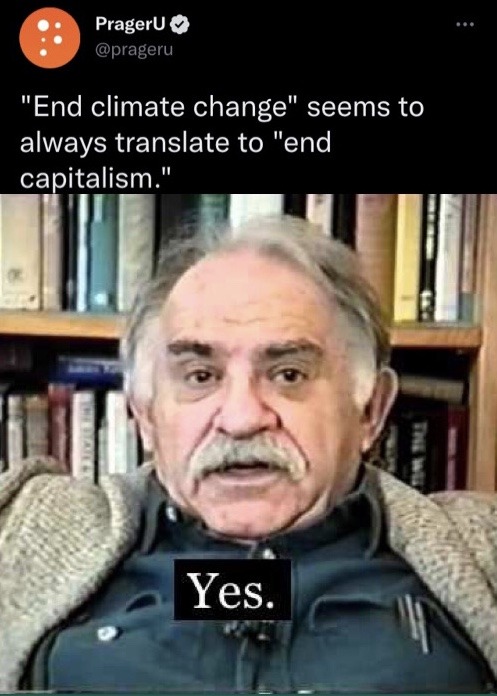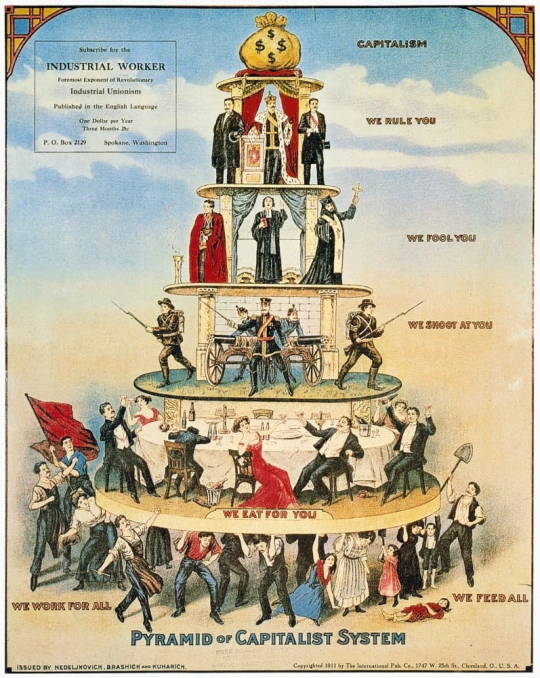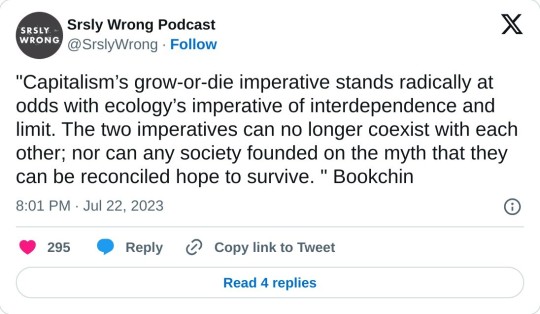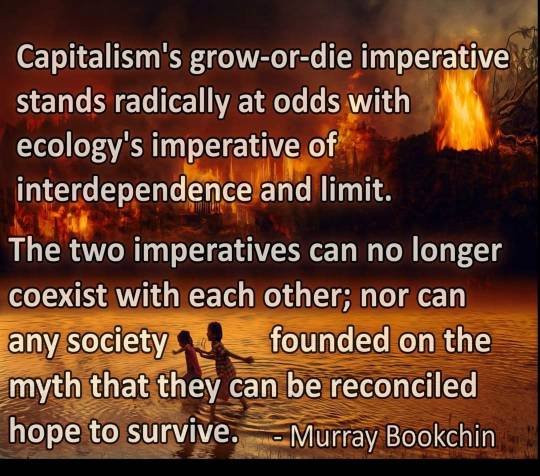#Murray Bookchin
Text

10K notes
·
View notes
Text


#civilization#murray bookchin#book is cities without urbanisation#anarchism#social ecology#anthropology#urban planning#urbanism
61 notes
·
View notes
Quote
Human society evolves out of the strictly zoological world of first nature, and is no less a part of the biosphere than are pods of whales or flocks of birds. The issue is therefore not humanity or civilization per se, but a particular hierarchical, colonial, capitalist society which simplifies and interrupts Earth systems to the detriment of humanity and other species. “[I]f we are not to sink into the fatuities of romanticism and mysticism,” Bookchin argues, then the question is “not whether humans should intervene into nature…but how they should intervene and toward what ends." The structure of our society inexorably determines our ontological outlook and subsequently our relations with the rest of nature; we can design it to function in reciprocity with the rest of the natural world, or in conflict with it. Our task is not to return to an idealized past, or to fetishize and appropriate the cultures of Indigenous peoples. Rather it is to determine which aspects of the current dominant society bring us into conflict with the rest of the natural world, to identify the historical junctures out of which these characteristics arose, and to imagine alternative paths society could take. In this endeavor, societies which have developed along more ecological paths are indispensable resources.
Nathaniel Owen, Decolonizing Nature: How “Wilderness” Dispossesses Indigenous People
256 notes
·
View notes
Text
youtube
A really good, albeit not in-depth, summary and introduction to Bookchin's ideas.
Highly recommend listening if you're at all interested in ecosocialism or green anarchism
42 notes
·
View notes
Text

#plenty#abundance#scarcity#the only tragedy of the commons was its enclosure#fuck capitalism#murray bookchin#anarchy
632 notes
·
View notes
Text

The trick of every ruling elite from the beginnings of history to modern times has been to identify its own socially created hierarchical systems of domination with community life as such, with the result being that human-made institutions acquire divine or biological sanction.
— Murray Bookchin, Remaking Society
22 notes
·
View notes
Quote
Every organisation (however revolutionary its rhetoric and however well intentioned its goals) which models itself structurally on the very system it seeks to overthrow becomes assimilated and subverted by bourgeois relations. It's seeming effectiveness becomes the source of its greatest failure.
Murray Bookchin “Anarchy and Organisation: A Letter to the Left” (1969)
#@ppl inviting me to join their boards of management.#this is my criteria#last year i made a post about nonprofit brain rot and this is exactly what i mean#organisations that think they can save the world while subjugating their workers#brain. worms.#Murray Bookchin#like how u can't hate yourself into someone you'll love#me fein#politics
122 notes
·
View notes
Text
He talked about returning so many things to the hands of the people, like economic power. He thought that the economy needed to be put in the hands of bottom up, self-governing bodies based on the assembly. He wanted technology to be decentralized—he would have loved Apple computers, maybe not the company, but the decentralization that the laptop computer brought about was just remarkable to him. He wanted automation to be small scale. It was about decentralizing and breaking up cities to small-scale cities that are integrated with agriculture.
So, the theme that I found when I was working on the biography was so many of his ideas were about decentralizing different parts of society and reintegrating them into a new whole. I call it eco-decentralism in the book, but that’s not a term he used. It was decentralizing for the purpose of restoring control to people. When I looked at what happened with him and anarchism, I wondered, “Why was he attracted to this ideology that he later broke with?” When I read his actual reasons for embracing anarchism in his earlier writings, I noticed that it’s because the state makes people passive. He admired that active political engagement in the Athenian polis, where people could actively be involved in their society, rather than be passively turned into anonymous faceless crowds of the New York that he was living in.
And I think, regardless of what you think about anarchism or not, that’s something that we need to preserve from him. He agreed with Aristotle that we are political animals and we need to engage. That was, I think, one of his main driving features was to create the engaged citizen, engaged at the local level, and in the surrounding regions, instead of just turning over their minds to the state.
53 notes
·
View notes
Text
"Whether as drama, novel, science fiction, poetry, or an evocation of tradition, experience and fantasy must return in all their fullness to stimulate as well as to suggest."
Murray Bookchin (author, The Ecology of Freedom: The Emergence and Dissolution of Hierarchy, 1980)
#writeblr#writing#fiction writing#novel writing#poetry#literary tradition#intellectual stimulation#fantasy writing#writing tips#writing advice#quote#murray bookchin#the ecology of freedom
29 notes
·
View notes
Text
"As long as hierarchy persists, as long as domination organises humanity around a system of elites, the project of dominating nature will continue to exist and inevitably lead our planet to ecological extinction." ~ Murray Bookchin
Humanity is not a parasite - Saint Andrewism
youtube
#anarchism#anarchistcommunism#anarchocommunism#anarchopunk#communism#anarchist#communalism#murray bookchin#ecology#environment#enviromental#environmentalism
20 notes
·
View notes
Text
An anarchist society, far from being a remote ideal, has become a precondition for the practice of ecological principles.
-- Murray Bookchin

#Murray Bookchin#leftistquotes#book quotes#quotes#quoteoftheday#book quote#life quote#beautiful quote#quote#quotable#ausgov#politas#auspol#tasgov#taspol#australia#fuck neoliberals#neoliberal capitalism#anthony albanese#albanese government#eat the rich#eat the fucking rich#fuck the gop#fuck the police#fuck the patriarchy#fuck the supreme court#fuck the tories#anti capitalism#antinazi#antiracism
7 notes
·
View notes
Text

7 notes
·
View notes
Text
"Usufruct, in short, differs qualitatively from the quid pro quo of reciprocity, exchange, and mutual aid — all of which are trapped within history's demeaning account books with their 'just' ratios and their 'honest' balance sheets...What 'civilization' has given us, in spite of itself, is the recognition that the ancient values of usufruct, complementarity, and the irreducible minimum must be extended from the kin group to humanity as a whole."
-Murray Bookchin-
75 notes
·
View notes
Quote
When a corporation or state takes action to worsen working conditions, reduce wages, or deny poor and vulnerable people the elementary amenities of life, social anarchists should raise their voices in protest and join in actions to prevent such measures from being executed. In short, they should fight exploitation and injustice on every front and become part of a variety of struggles for eliminating economic, social, and ecological abuses wherever they occur, at home or abroad. Social anarchists are no less humane in response to human suffering and no less outraged by social afflictions than the best-intentioned reformists. But their actions should not be limited merely to advancing remedial measures – which the bourgeoisie can usually adopt if it chooses to, with little loss to itself. Indeed, bourgeois society is sometimes more than willing to ameliorate social afflictions within its own framework, all the better to conceal broader social problems or to neutralize the danger of wider social unrest.
Murray Bookchin, The Unity of Ideals and Practice
58 notes
·
View notes
Text

This pamphlet is the most accessible introduction to Murray Bookchin's ideas I've found, the language is uncomplicated and the text isn't dense. I highly highly recommend it to anyone interested in social ecology and communalism, and especially to anybody who's keen to get started on socialist theory but finds its academic language and length intimidating.
#murray bookchin#communalism#social ecology#libertarian socialism#freeblr#anarchism#Socialist theory
30 notes
·
View notes
